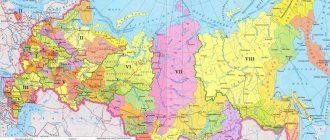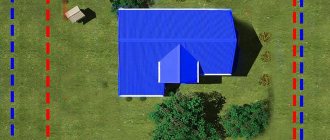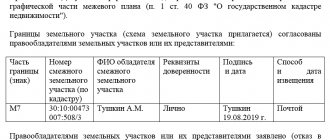Home / Real estate / Land / Provision
Back
Published: 01/09/2017
Reading time: 15 min
0
1636
In Russia, certain categories of citizens have the opportunity to obtain land for construction from the state.
This can be done on a paid or free basis. Land is provided for rent or temporary use.
- Legislation
- Reasons for receiving
- Conditions of receipt
- Required documents
- Regulations on the provision of land plots for the construction of residential buildings
- When is refusal possible?
- Important details to pay attention to
Legislation
A plot is a part of the earth's surface, the boundaries of which have been certified in the prescribed manner. The procedure for providing land owned by state and municipal authorities is prescribed in the Land Code. Certain provisions are contained in the Civil Code.
Russians are guaranteed equal access to land. State and municipal authorities have the right to lease land (ownership) on a paid basis or free of charge.
A type of lease agreement is a transaction with the purchase of a plot from the state at a symbolic price.
The right to determine criteria for land allocation free of charge is assigned to the regions. At the same time, at the time of its transfer, the site must have clear boundaries, be registered in the cadastral register and be displayed on the Rosreestr map.
The minimum and maximum size of plots is set at the discretion of local authorities. They depend on the region where land plots are provided for housing construction, the availability of free land, the economic situation in the region, etc. Typically, the minimum allotment is 3 acres, the maximum is 1.5 thousand sq.m.
Land legislation provides for two procedures for providing plots for individual housing construction: without bidding and with an auction. Here are a number of reasons for providing land without bidding:
- sale of land (clause 2 of article 39.3 of the Land Code);
- provision of land free of charge (Article 39.5);
- when concluding a lease agreement without bidding (Article 39.6);
- provision of plots for free use.
Thus, land for individual housing construction can be obtained free of charge without bidding. At the same time, the Land Code states that executive authorities are required to publish a notice of preliminary approval for the allocation of land to a citizen.
If no other applications for participation in the auction are received, then the authorities are obliged to allocate the site without bidding.
Repeated publication of the message by the executive body is not required.
Concept
Land allocation refers to the process of transferring state land to individuals or legal entities. This transaction is secured by a special document - a provision agreement , which fixes the main provisions:
the purposes of the individual or legal entity for which the site is allocated;- basic conditions for separation;
- the period during which a legal entity or individual can dispose of the site;
- the procedure for terminating the contract in cases where land is provided for a certain period;
- the procedure for registering land as the property of the new owner.
The procedure for transferring a land plot from the state to other persons is regulated by law. In this case, the main document is the Land Code of the Russian Federation (LLC RF) Ch. V.1.
Reasons for receiving
The Land Code secures the right to land plots for large families on a free basis.
These include families that are officially married and have three or more minor children. Heroes of the USSR and the Russian Federation can also receive land for individual housing construction.
Tenants who received the right to use it back in Soviet times and built a house on it can count on the transfer of a land plot into free ownership. Or the owners of land that was allocated to them on the basis of perpetual or lifelong ownership.
The right to free plots is assigned to them at the federal level.
The remaining categories of beneficiaries are determined at the regional and municipal level.
It is local authorities who have the right to determine groups of citizens who are allocated free land. Typically these include:
- persons who are officially recognized as in need of improved housing conditions (living space per person in a family is less than the regional standard in sq.m., live in a dilapidated house or dormitory);
- persons with disabilities and members of their families;
- families who care for disabled children;
- veterans of the Second World War and military operations or families who lost their breadwinner during military operations;
- young specialists working in priority professions under programs to attract in-demand personnel to the village;
- pensioners who permanently reside in the village;
- disabled people or members of their families.
All of these persons can exercise their right to a free plot of land only once .
Among the citizens who could apply for land plots to build a house there, one can distinguish a group of persons with priority rights. These are large families and families with disabled children.
Allocation of land for rent or for acquisition of ownership
In what possible circumstances can citizens usually lay claim to a piece of land?
Typically we are talking about the following situations:
- Construction of a residential building.
- Territory for personal farming.
- Gardening classes.
- Livestock activities.
- Land for dachas (for their construction and use).
- Horticulture.
- Haymaking or pasture.
In such conditions, as a rule, local authorities determine the norms for the area of land provided per family.
Conditions of receipt
The conditions for obtaining land for individual housing construction are different in each region. For example, to provide free land for individual housing construction in Crimea, you must live on the peninsula for at least 5 years. Whereas any citizen of the Russian Federation can receive a hectare of land in the Far East, regardless of registration . The main thing is that he is engaged in the exploration and development of the territory entrusted to him.
The conditions for the applicant may include the following:
- having the status of a young family (in which both spouses are no more than 35 years old) or a large family (in which there are three or more minor children);
- resolution recognizing a family in need of improved housing conditions;
- having the status of a young specialist, working in one of the priority areas in a medical or educational profile when concluding an open-ended employment contract within a rural settlement, etc.;
- availability of an official conclusion recognizing the child as disabled.
It is usually required that the citizen does not own any other land for similar needs.
So, if he or members of his family own a plot of land for a summer cottage, this does not deprive them of the right to be allocated free land for building a house. But they will not be provided with land for individual housing construction again.
Preferential category
In March 2015, changes were made to the Land Code of the Russian Federation regarding the allocation of plots of land for individual housing construction to citizens.
According to Article 39.5, a preferential category of citizens is defined who have a chance to receive ownership of a plot from the municipality for free.
The form of ownership is rent.
Expert lawyer's opinion:
Expert opinion
Gumenyuk Ekaterina Vladimirovna
Rosreestr - worked as a state registrar of rights. Head of the property department. I help solve problems that arise with real estate.
Required documents
The list of documents that will be required to obtain land from the administration depends on the category of benefits. Typically, the list of requested documentation includes:
- passports of all family members/birth certificates;
- a document confirming registration in the region for 3–5 years (this can be a stamp from a passport or a court decision);
- a certificate from local government authorities stating that the citizen has not previously used his right to a free plot;
- a document confirming the right to benefits (medical certificate of disability, work record book, certificate of a combat veteran, pension certificate, etc.).
Regardless of the category of citizen, he must provide a completed application for the allocation of land. The application is submitted for the purpose of preliminary approval of the selected site or for the allocation of land without bidding.
After receiving such approval, another application is submitted with a request to provide the site. It indicates the purpose of the object, the proposed location of construction of the building and its area, justification for the size of the land, the requested right to the land (lease, ownership).
In the future, after the construction of the house, together with the lease agreement (or other agreement), passports, cadastral documentation, you can re-register the plot as property.
On what rights can a memory be granted?
Types of provision of land plots and under what conditions they can be claimed are two different legal categories.
Types may vary, and rights are divided into two types:
- Right of ownership (the land plot is completely transferred to the ownership and disposal of the plot).
- The right to use the site (this type gives permission to use the site at your own discretion, but without the right to transfer ownership to the recipient until the conditions established by the contract are fulfilled).
From the right of use, ownership can be re-registered if the citizen has fulfilled all the conditions in accordance with the law. For example, a young specialist is given land for a period of 5 years. If a house is built during this time, both the housing and the land can be re-registered free of charge.
Read about all the features of legal relations regarding the ownership, use and disposal of land plots here.
Regulations on the provision of land plots for the construction of residential buildings
The general regulations for the provision of land for individual housing construction are prescribed in the Land Code. Article 30 provides two options for the allocation of land from state and municipal property:
- without prior approval of the location of objects;
- provision of land plots for construction with prior approval.
According to land and town planning legislation, preliminary approval is not required in some cases. In particular, if the object is located within a city or village and complies with urban planning documentation and zoning of the territory. Also, preliminary approval is not required when allocating land for agricultural or forestry needs or to a citizen for individual construction or running private household plots.
The sequence of obtaining a land plot can be represented as follows:
- The applicant prepares a layout diagram of the land plot and submits an application for its preliminary approval to the authorized body. If the application does not comply with the established form or all necessary documents have not been attached to it, then the applicant is given a refusal in writing.
- Within no more than 30 days, the authorized body is obliged to publish a notice of the provision of the site. It is published only once.
- If other applications for this site are received within a month, then within 7 days a decision is made to refuse preliminary approval and an auction is announced. After the auction, a protocol with its results or a decision to declare it invalid is signed.
- If it was not possible to find others willing, then a positive decision is made to approve the land.
- The interested party carries out cadastral work to form a plot or clarify its boundaries with the help of a cadastral engineer. Two years are allowed for this after receiving preliminary approval. When carrying out these works, the boundaries of the site are established on the ground and their plan is prepared; if necessary, boundary signs are installed on the ground. The next stage: determining the permitted use of the land and technical conditions for connecting to utility networks.
- The plot is registered with the state cadastral register, and technical documentation is obtained for it.
- A new application is submitted to the authorized body with a request to provide a plot of land. The decision to refuse or provide land is made within 30 days.
- If the decision is positive, municipal authorities prepare draft lease agreements, free use or purchase and sale agreements. If the lease agreement is concluded for a period of more than a year, then it must be registered with Rosreestr. If it is indefinite, then registration is not necessary. After building a house on the land, ownership of the building must be registered with Rosreestr.
Types of land provision by the state
Land plots that are in municipal or state ownership may become the subject of a transaction. The main types of relationships are shown in the table:
| View | Short description |
| Sale | Sale through public auction or through the exercise of the right of first refusal from a person representing the interests of official bodies. |
| Rent | Rights are transferred openly through public auction. Repeated renewal of the lease agreement is carried out without bidding. |
| Permanent unlimited use | In this case, a certain fee is established for the use of land. |
| Free urgent use | The land is exploited in accordance with its intended purpose, there is no fee for use. |
The table reflects the key areas of transfer of land from the state to a legal entity or individual. In this case, the land becomes the object of a transaction; to obtain it, a purchase and sale agreement is drawn up in accordance with legal norms.
But there are situations when it can be allocated free of charge on a preferential basis to certain groups of citizens (Article 39.5 of the Land Code of the Russian Federation).
Even if a citizen has the right to receive preferential land, then legally a sales contract is still concluded, but it does not require payment for the plot.
It is believed that the citizen covered the cost of the land by paying for the services of preparing cadastral and boundary documents. An exception is the conclusion of a contract for gratuitous fixed-term use.
When is refusal possible?
The Land Code clearly limits the grounds for refusal to provide land. As a rule, these include the following:
- an application was made by a person who does not have the right to count on the allocation of land to him without bidding;
- the site is burdened with the rights of third parties (or was simply already occupied at the time of the application);
- the plot was provided to NPOs for gardening, dacha farming, vegetable gardening and integrated development of the territory for individual housing construction;
- the site contains buildings, structures and unfinished buildings that belong to other citizens, legal entities or municipal authorities;
- the site has been withdrawn from circulation or limited in circulation;
- the land is registered for state and municipal needs;
- the site is located on territory that is given to another person for development; land is the subject of an auction;
- the area of the requested plot for construction exceeds the maximum area standard;
- objects of regional significance or buildings within the framework of state programs should be located on the site;
- plots on the declared type of rights are not allocated;
- in relation to the land, a decision was made on preliminary approval of its provision;
- land was seized for state and municipal needs.
The applicant may also be refused if the purpose of the plot does not correspond to the purposes of its use or if it is not classified at all in any of the categories of land. Additional grounds for refusal may include: the need to clarify the boundaries of the land, discrepancy between the declared area.
In addition, regional authorities have the right to develop their own criteria for granting a refusal.
The most common reasons for refusal are the applicant’s category not meeting the requirements for the recipient, incompleteness of the documents, or the discovery of inaccuracies and factual errors in them.
Needy and low-income citizens can count on the provision of residential premises from the flexible fund. Are you planning to buy a plot of land in installments? Our article contains a sample contract and describes the features of its preparation. The acquisition of land for individual housing construction has its own characteristic features. You will find detailed information about them here.
Transfer of land without prior approval
If there is no prior approval of the land being transferred, then an auction is mandatory. In this case, certain work must first be carried out in order to form the site provided.
Such work includes:
- A draft of the boundaries of the area under consideration is prepared and then the final formation of its boundaries is carried out.
- It is determined for what purposes the site is permitted to be used.
- Determination of various technical conditions for connecting an already built house to all necessary communications in the future.
- Making a decision on the procedure for providing land through an auction or without an auction.
This is the first stage of activity. Subsequently, cadastral registration must be made. At the same time, compliance with the rules formulated in Art. 70 of the Land Code of the Russian Federation. After this, an auction must be held. If there is only one application, then a decision must simply be made about it. If the latter option occurs, then it must be officially published. An appropriate protocol must be drawn up. Within seven days, the decision must be communicated to the applicant.
Norms
According to the Land Code, land plots transferred for use or ownership by individuals and legal entities are necessarily determined by special parameters. These include:
- Land category. The state cannot transfer ownership of lands such as forests, protected lands on which water bodies are located, and those areas that are located in the exclusion zone. A person can be given land for ownership - this is land for settlements and for agricultural purposes. Transfer of other categories of land into ownership is impossible.
- Size of land plot. Specific indicators are not regulated in the Land Code, since each region has its own norm depending on natural and climatic features, so citizens should focus on regional regulations. But the plot must be no less than six and no more than fifteen acres. Such indicators are established for all areas, regardless of the purpose of use.
- Fertility level. This indicator also applies to all areas. It does not matter whether the land is required for the construction of a farm or housing, where in any case a household plot will be organized. This category also includes the presence of nearby landfills with household waste or industrial enterprises that can have a negative impact on the crop.
- Location of the site. The state does not allocate land plots located near engineering enterprises, the state border and objects whose work is aimed at providing for the country. They can be rented for a certain period only for certain purposes, for example, farming without erecting large buildings.
Procedure
The procedure for providing land ownership from the state fund is carried out in accordance with regional legislation in the field of land and property relations. But regulations should not contradict laws at the federal level, so the process has general actions:
- searching for a vacant plot of land with no buildings on it;
- checking whether the site has a cadastral passport and other property rights to it from other persons (information is provided at the administration);
- determination of the area in which the land is located;
- drawing up an application indicating the grounds for obtaining land and the purpose for it;
- if a cadastral passport is missing, then specialists will oblige you to issue it and conduct a geodesy of the site;
- waiting for a decision by the land commission (what to do if a refusal to provide land plots is received?).
Where to contact?
The process and establishment of the procedure for the provision of land plots in each specific locality is carried out by the corresponding authorized state or municipal authority. Often this is the administration of a city or region, where all applicants for land are required to apply.
How to submit an application?
The legislation does not contain an application form, but it specifically describes what information must be provided:
- name of the institution where the application is sent indicating the exact address and authorized person;
- information about the applicant: full name, passport details, residential address, TIN, telephone number;
- request for a plot of land;
- information about the land plot: location, cadastral number, area;
- for what purposes is the land plot needed;
- a list of attached documents that prove why this particular citizen should be allocated an allotment;
- date and signature of the applicant.
Read more about the application for the provision of a land plot separately.
Required documents
The main list of required documentation includes:
- applicant's passport;
- an extract from Rosreestr confirming the absence of ownership of a land plot;
- diagram of the land plot, if the formation of an allotment is necessary;
- a document confirming the right to receive land;
- statement.
The list of documents may change depending on the conditions for obtaining and the region of residence, so you should find out the full list in advance from the employees of the authorized body.
Everything about the provision of a land plot, namely, where to apply for a land plot, how to complete the procedure and what documents need to be submitted, is described in detail in a separate material.









